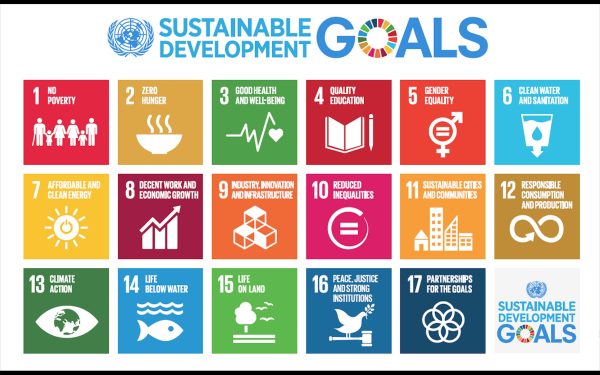Sustainability Benefits Your Startup and the World UN Sustainable Development Goals for Founders
Purpose-driven Ventures Thrive
Sustainability benefits your startup and the world. Purpose-driven ventures thrive, creating both shared value and profits. Successful founders set sustainable development goals because they are vital for survival—altruism pays off.
All goals are tough to set, especially to ensure they’ll be sustainable, rather than simply a list of pious hopes. Building them into a convincing business plan is even more of a challenge, but with the advantage that the startup will produce better results.
Purpose-driven Sustainability Plan for Startups
A template for strategic thinking about the sustainability of a startup is freely available in the UN’s seventeen Sustainable Development Goals (SDGs). Just take a look! You’ll be amazed at how your commitment to sustainable purpose will enliven the new venture, while energizing performance.

The application of the SDGs to the conception of the new enterprise enables the stressed entrepreneur to have a structure to her own plan for her stakeholder-focused startup. The 17 goals represent a $1.5 trillion business opportunity in themselves, let alone the benefits to mankind—so sustainability benefits your startup.
One pressing example is clean energy (Goal #7). A significant cost center in any business is energy consumption. In the US clean energy is set to expand significantly, not least as a consequence President Biden’s signature of the Executive Order to rejoin the Paris Climate Accord. Planned investment of $2 trillion in clean energy, and the full decarbonization of the power sector by 2035 are both consequences of the Government’s policy.
Purpose-driven SDG Planning Process Works—Sustainability Benefits Your Startup
Entrepreneurs who work through all 17 SDGs, will find ways both to contribute and benefit. Although Unilever is far from being a new venture, under former CEO Paul Polman, it became very entrepreneurial in its commitment to the SDGs. Unilever describes them as a once-in-a-lifetime opportunity to create a better world. Have a look and use their approach as a model for your own business. They see No Poverty (Goal #1) as a $12 trillion opportunity!
You are creating a tiny startup, so how can you contribute to a goal as huge as ending global poverty? Surely not as a two person enterprise? But if you look at each of your proposed business activity areas using the SDG ‘template’, you’ll soon realize that oh, yes, you can—and see how sustainability benefits your startup.
SDG Planning—Clean Water, as an Example
Take Clean Water (Goal #6) as another example. Your first thought might be, “I’m going to make wind turbines, so what’s clean water got to do with me?” Nothing, at first glance, but where are you going to source your materials and parts? Who makes them? With what raw materials? Where, and what’s the cost of getting them to where you are? You may want to consider the wages of those who mine them…
Think about the design of your innovative wind turbines. Despite the turbines being a nice green product, one component you’ll probably need are magnets made from neodymium and dysprosium, rare earth minerals. Rare-earth mines involve processes that contribute to pollution. Some generate thorium, a radioactive element that leads to leukemia, when it leaches into drinking water. Workers have to extract rare earth metals manually from the ore which increases their exposure to these toxic metals.
I think you see where this is leading. The way to map your new startup against each of the Sustainable Development Goals is to go through each of your Sources (raw materials, people and other inputs), Processes (manufacturing, distribution and other business functions) and Outcomes (benefits, dis-benefits and other downstream consequences). Consider the impacts both on your business and society.
Codify and Monitor Impact
Here’s the tough part. It’s no good to simply define intentions. You will have to both establish clear rules and behaviors as well as the means by which performance can be measured. Measurement has to be as accurate as you can make it through external or internal means and benchmarks. The measurement must to be shared inside and outside the company.
But here’s the good part of all that painful and meticulous work. If you take the right decisions as a result of your analysis, you will experience several things apart from exhaustion! You will feel exhilaration from realizing that your high sense of purpose motivates not only you, the founders, but also those with whom you work, the users of your products, and the community in which you live and work.This is why there is so much talk about the ‘circular economy’ at the current time.
A Journey, Not a Destination—Sustainability Benefits Your Startup
When you are using the SDGs as a template, don’t think that you only do the process once! Feedback from others may delight or alarm you. Regular reappraisal is needed as your business matures, performance improves and the world around you changes.
The wonderful thing, if you do it right, is that the sustainability of the venture is going to increase the more you refine policies and behavior. But you do not need to try to reinvent the wheel on your own. I know from experience just how 24 hours a day are not enough for the harassed entrepreneur to complete the never-ending goals she wants to achieve. There is FREE help at hand: the SDG Action Manager, developed by B Lab in conjunction with the UN Global Compact. The Action Manager will help you with the whole process.
Dan Ousky, the Standards Director at B Lab, who worked on the Action Manager, suggests how you can best use the tool, in a Fast Company article, How to Incorporate the Sustainable Development Goals into your business. Take a look! And see how sustainability benefits your startup.
Inspiration from elsewhere at Venture Founders: how sustainability benefits your startup
It may sound as though working with the UN’s Sustainable Development Goals will be arduous and remote to the nitty-gritty of getting your venture off the ground, so take the (brief) time to read about Rewriting the Rules of Business. Things are not like they used to be and the imperatives of now oblige us to change some of our preconceptions about entrepreneurial priorities.
We can now see that shareholder capitalism no longer works well for all members of society; ‘trickle down economics’ does not work. Its selfish ends are distorting the Keynesian unseen hand of market forces.The one per cent have stopped the community blood flow by hoarding capital. We have to realize that all sections of the community are interdependent. We can no longer assume that ‘the other guy’ will deal with the negative issues we knowingly, or unwittingly, create for others through our own business actions. For more, see The Interdependence of Business. I think you’ll become convinced that a commitment to sustainability benefits your startup, as well as the world.






